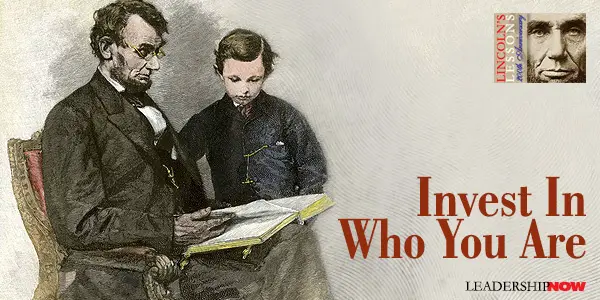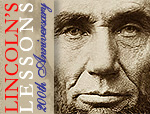 |
 |
02.13.09

Lincoln’s Lessons: Invest In Who You Are
 Newspaperman Horace Greeley once said of Lincoln, “Lincoln gladly profited by the teaching of events and circumstances, no matter how adverse or unwelcome….There was probably no year of his life that he was not a wiser, cooler, better man than he had been the year preceding.” This quality alone no doubt allowed Lincoln to grow into a fully integrated man. He invested in “who” he was and not just the “what” of the work he was doing. The “who” makes the “what.” The experiences of his life gave him the ability to face the negatives with clarity and resolve. He learned that, most often, the only way out is through. He learned to be able to judge the dilemmas that often arise from navigating strong convictions and the demands of the moment. This only comes about by knowing who you are and what you believe. The quality that most defined Lincoln was his internal consistency or wholeness. Integrity is the key to influence. Lincoln's contemporaries sensed his integrity in everything he did, a quality that still moves people today. Lincoln once described the workings of his mind to his friend Joshua Speed. He said, “I am slow to learn and slow to forget that which I have learned. My mind is like a piece of steel—very hard to scratch anything on it and almost impossible thereafter to rub it out.” William Lee Miller points out in Lincoln's Virtues, that Lincoln was good at finding the crux of the matter. “He would become a thinker in particular about moral ideals as they intersect with politics. And his qualities of mind meant that not only facts and ideas, once acquired, stayed with him, but that political and moral positions, once he worked them out, would not be lightly abandoned.” Lincoln was not without fear, however. Yet even with his doubts and fears, Lincoln possessed a hope that was rooted in character. “The hope is not that suffering will go away, for with Lincoln it did not ever go away,” writes Joshua Shenk in Lincoln’s Melancholy. “The hope is that suffering, plainly acknowledged and endured, can fit us for the surprising challenges that await.” Of Related Interest:
Posted by Michael McKinney at 12:10 AM
|
BUILD YOUR KNOWLEDGE
 

How to Do Your Start-Up Right STRAIGHT TALK FOR START-UPS 
Grow Your Leadership Skills NEW AND UPCOMING LEADERSHIP BOOKS 
Leadership Minute BITE-SIZE CONCEPTS YOU CAN CHEW ON 
Classic Leadership Books BOOKS TO READ BEFORE YOU LEAD |